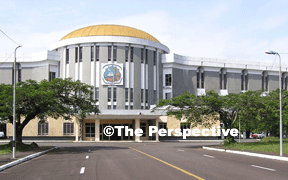
The Perspective
Atlanta, Georgia
November 30, 2004
 |
|
The Capitol
|
The caller noted that the position, adopted by the majority members of the Assembly, is difficult to accept. He did not accept the constitutional argument. The caller pointed out that the current architecture of the transitional government does not embrace constitutional provisions. If it did it would not be called a transitional government. This line of logic then proceeds accordingly. The constitution requires a bicameral legislation, which we do not have. It calls for an elected government, which we do not have, it calls for checks and balances among the various branches of government which we do not have, it requires that our Head of State be called President, we have a Chairman…
The argument goes on to point out that preparation for a credible census may require two to three years, the CPA gives a life span of two years to the transitional government. There is not enough time. This government has not demonstrated particular concerns about issues relevant to the public and it is perhaps tomfoolery to think that it would secure the necessary funding to conduct a census. Given the positions thus far demonstrated by donors, there is not a penny earmarked for conducting a census. A country that pleaded with donors to donate wheelbarrows for the collection of garbage in its major city while it purchased “luxury vehicles” for its functionaries, appears to have lost the moral basis to call upon donors for funding support and certainly not for a census prior to the elections. These objective indicators dictate that a census is not at all possible before October 2005.
The public is duly concern that some solution to the developing impasse is found. The decision to reject the Motion to Reconsider by the Assembly during the past week puts the “ball in the court” of the Chairman of the NTGL. He can reject or accept. I advise that any decision be preceded by consultations. A conference with the NTLA would be a good starting point. Let all 76 members of the Assembly be cited to attend such a very important conference and let all the concerns be placed on the table and a civil, informed and reasonable debate take place. The public could be called upon to make representations and express their opinions. Our public figures should eschew the “highly fractionalized political culture” which has “sought to institutionalize conflicts” and embrace “centrifugal forces” that seek to “nurture and cement national unity” as Okoth-Ogendo, warns in State and Constitutionalism: An African Debate on Democracy (Edited by Issa Shivji). The debate must not rest on vindictiveness and or self-righteousness but must be accommodative to what constitute the public interest as the nation wrestles with the huge task of constructing a deliberative and tolerant democracy. In this regard, Okoth-Ogendo views the role of politicians and political parties as not having to “organize around ancient claims, accrued rights, future demands or matters… peculiarly sensitive to [ethnicity], religion…” Instead, political parties should be “vehicles for the enhancement of such constitutional values as electoral sovereignty, majoritarian rule or popular power.” He warned politicians about being “purveyors of irredentist ideologies,” so much of which is now on display in Liberia. I am not too sure that our politicians grasp this point sufficiently but they should or be made to appreciate this cardinal value.
The late President of Tanzania, Mwalimu Julius Nyerere, commented on constitutionalism similarly when he said that “The constitution of Tanzania must serve the people of Tanzania. We do not intend that the people of Tanzania should serve the constitution. Ditto for Liberia.
About the author: Ezekiel Pajibo is the Executive Director for the Center for Democratic Empowerment (CEDE)
